KEY TAKEAWAYS:
Hardware and software compressors definitely both have their pros and cons. Hardware compressors give you an incredible sound but can be pricey and take more time to set up. On the other hand, software compressors are very easy to use but can sometimes sound cheap and digital.
Hardware and Software Compressors
It is essential to know the differences between hardware and software compressors.
You need to have a solid understanding of this to know which type of compressor to use.
I have had the chance to research and use both compressors, and I have a good idea of what separates the two.
Today, we will look at the differences between hardware and software compressors.

What Is A Compressor?
A compressor is an audio processor that reduces the dynamic range of an audio signal.
A hardware compressor is an actual physical piece of audio equipment. A software compressor is a plugin you use inside your DAW (Digital Audio Workstation).
Compression is one of the most common tools in music production. The first commercially available compressor came out in 1937.
Here are a few reasons that you might want to use a compressor:
- To give your audio signal some power and punch
- To add color to your audio signal
- To make your audio signal sound nice and loud
- To even out the peaks and valleys of your audio signal
- To give your audio signal a balanced and full sound
How A Compressor Works
A compressor reduces the dynamic range of an audio signal. It does this by lowering the volume of louder tones and amplifying quieter ones. This is what’s known as compression.
There are many ways to use compression, but this is the basic gist of how it works.
Types Of Compressors
Some of the main types of compressors are:
- VCA (Voltage Controlled Amplifier) Compressors:
A VCA compressor is known for giving some of the cleanest compression.
- FET (Field Effect Transistor) Compressors:
You can use a FET compressor to add pleasant distortion and color to your audio signal.
- Optical Compressors:
Optical compressors are great for smoothing out audio without adding too much color.
- Tube Compressors:
Tube compressors are great for adding some vintage feeling and color to your track.
Hardware Compressors
Let’s dive into the specifics of hardware compressors.
Advantages Of Hardware Compressors
Here are some advantages of using a hardware compressor:
- They give you a more natural and warm sound than a software compressor.
- They can be more fun to use than a software compressor.
- They are great for people who like a more hands-on approach to music production.
- They are physical units which means they have some resale value.
- They can significantly upgrade your studio setup if you are a serious mix engineer/music producer.
Disadvantages Of Hardware Compressors
Here are some disadvantages of using a hardware compressor:
- They are typically more expensive than a software compressor.
- They require more setup than a software compressor.
- They are less convenient to use than a software compressor.
- They are harder to restore to previous settings (if a past client wants you to rework something).
Examples Of Hardware Compressors
Here are some different examples of hardware compressors:
- The dbx 560a is a compact compressor/limiter with some solid customer reviews.
- The Lindell Audio 7X-500 is a reasonably priced FET compressor
- The Warm Audio WA76 is a single-channel compressor based on a classic from 1976.
- The Avalon VT-737sp is a high-end channel strip audio unit. This audio processor has both compression and EQ settings.
Remember to only invest in a hardware compressor after doing your research. You must know precisely what you are looking for!
Software Compressors
Now, let’s look into the details of software compressors.
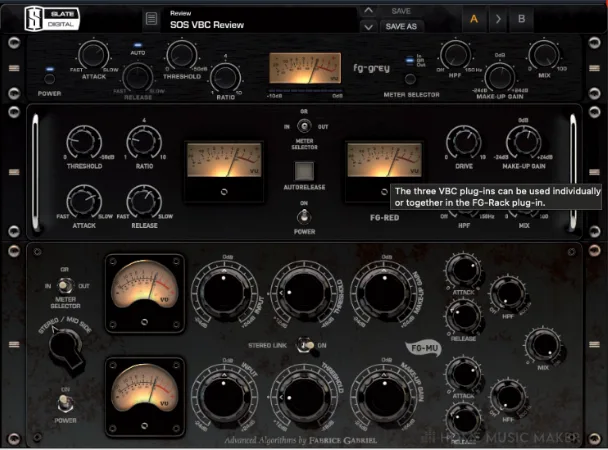
Advantages Of Software Compressors
Here are some advantages of using a software compressor:
- They are typically more affordable than hardware compressors.
- They require no setup, unlike hardware compressors.
- They are easier to use than hardware compressors.
- You can save the settings on compression plugins with each project that you work on. This is important in case a past client needs something reworked.
- Software compressors that emulate hardware compressors can put great audio gear in the hands of those less fortunate.
Disadvantages Of Software Compressors
Here are some disadvantages of using a software compressor:
- They can sometimes have a cheap or digital sound compared to hardware compressors.
- They are less enjoyable to use since they have no physical aspect.
- They are computer software, so there isn’t any resale value.
Examples Of Software Compressors
Here are some different examples of software compressors:
- The GRIP Valve Drive Compressor is a great compressor plugin that can add vintage color to your audio signal.
- The Virtual Buss Compressor collection from Slate Digital comes with three superb compressors.
- The JST Gain Reduction 2 plugin is another awesome compression plugin. This one sounds particularly good on vocals.
- The FabFilter Pro-C 2 is one of the best compressor plugins from one of the best plugin companies around. I recommend this compressor plugin for any serious producers/mix engineers.
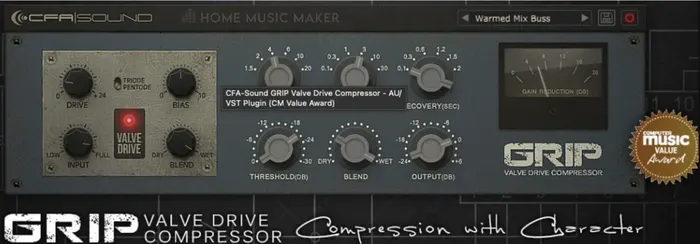

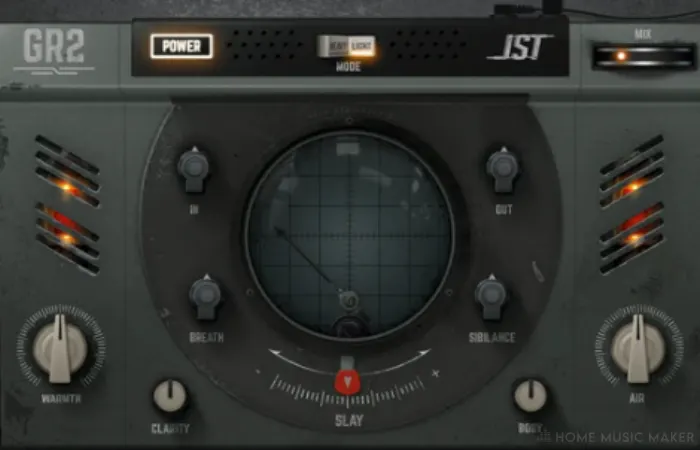
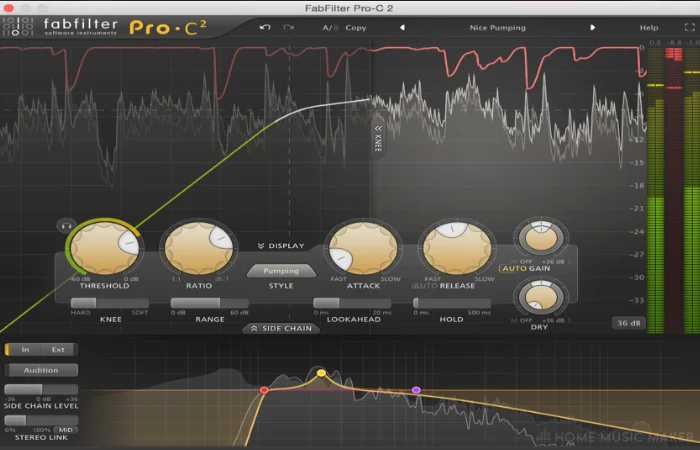
Pro Tip
Almost all modern DAWs will come with one or more solid compression plugins. There is no need to spend money on additional compressor plugins unless you want to.
Remember to do your research before choosing a compression plugin! You must select the one that is right for you.
Comparing Hardware And Software Compressors
Now, let’s compare hardware and software compressors head-on!
Sound Quality
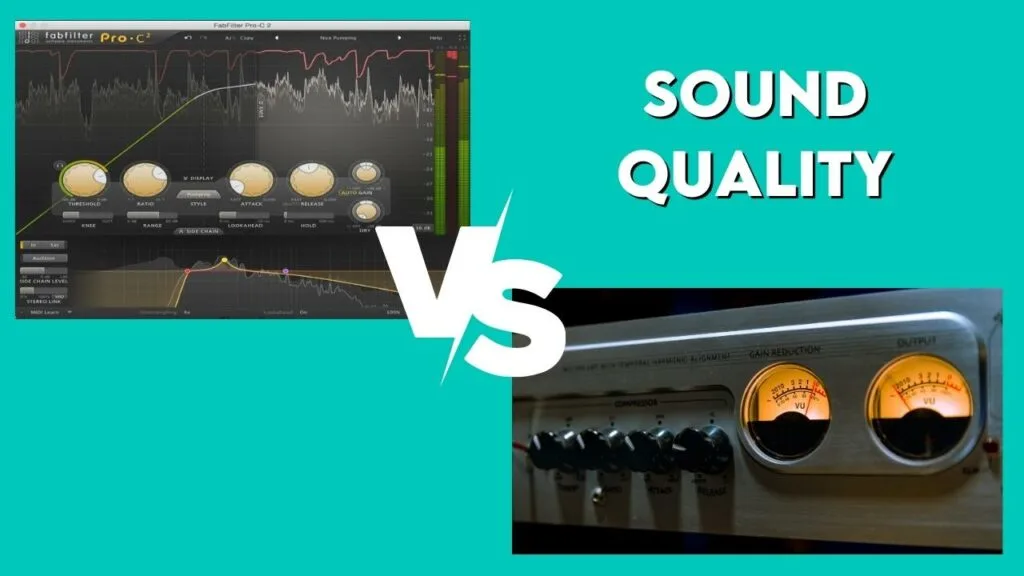
Regarding sound quality, hardware compressors have an edge over software compressors. In general, they typically have a more warm and natural sound.
Software compressors can sometimes sound digital or artificial.
At the same time, however, a cheap and low-quality hardware compressor will not sound as good as a high-end software compressor.
But let’s compare a high-quality and legendary hardware compressor such as the Teletronix LA-2A against a software version. The hardware compressor will sound better.
Ease Of Use
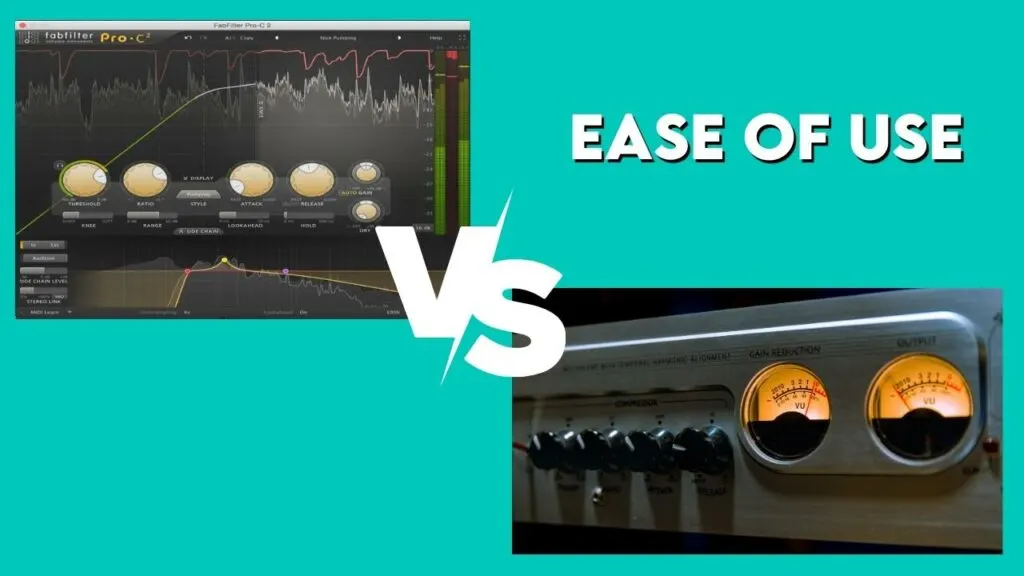
The apparent winner of this category is going to be software compressors.
Using a compression plugin is as easy as adding one onto your desired track in your DAW and getting to work.
To use a hardware compressor, you must manually set it up and wire it to your studio rig.
Although using a hardware compressor can be a lot of fun, software compressors are more accessible.
Cost
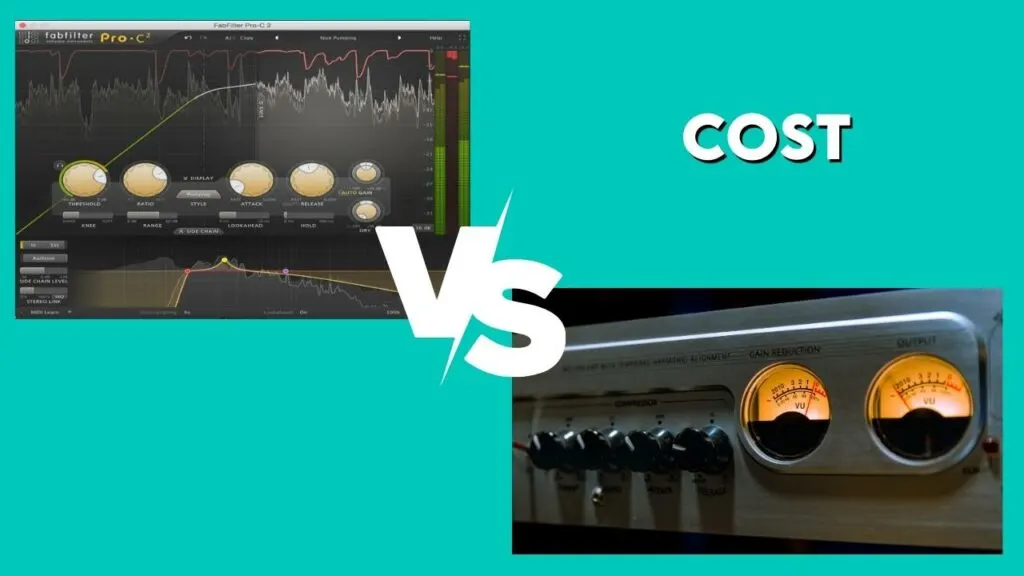
The winner is evident when you compare the cost of a high-end hardware compressor against the price of a high-end software compressor.
Software compressors are much more affordable than their hardware counterparts.
This is because a software compressor is just a piece of software. A hardware compressor, however, is a physical piece of equipment. This means parts, manufacturing, and distribution.
Flexibility
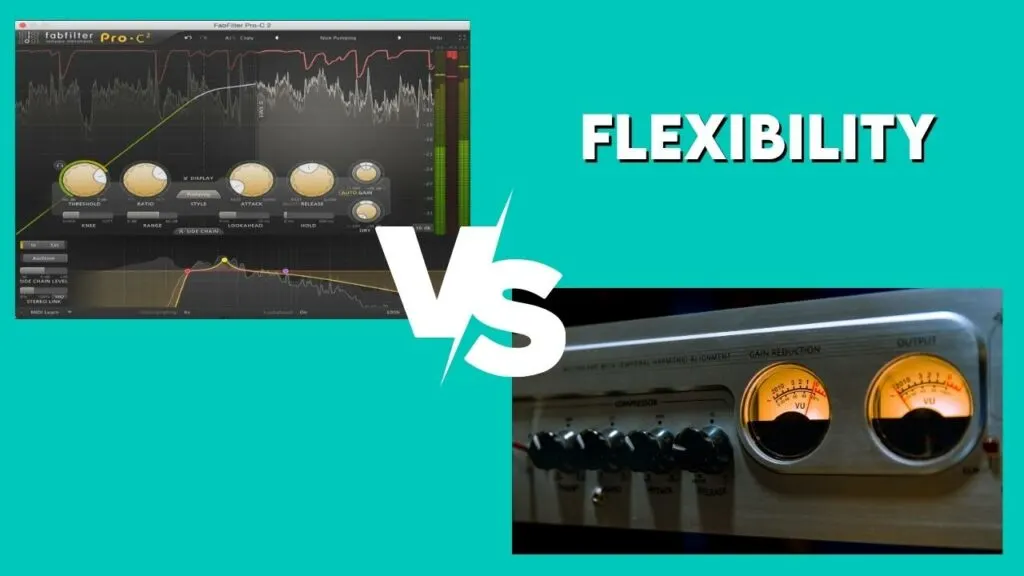
Regarding this one, hardware compressors are more flexible.
This is because while you can only use a software compressor in your DAW, you can use a hardware compressor for many different applications.
You can use a hardware compressor in combination with a DAW, a mixer, as a part of a guitar/bass rig, and much more.
Can Software Compressors Replicate The Sound Of Hardware Compressors?
These days, compression plugins are getting to be very accurate. Top mix engineers even use some of the higher-end compression plugins that are models of popular hardware compressors.
At the same time, many producers and mix engineers swear by using only hardware compressors.
No matter how you slice it, a software compression plugin is a digital tool, and even the best ones can still have a slight digital sound.
This is an issue that the audio community is always discussing. But even the best software compressors can only partially stack up to the best hardware compressors. However, the differences can be subtle, especially for someone who is not an audio professional.
Are Any Specific Genres Or Music Production Styles Better Suited To Hardware Compressors Or Software Compressors?
Yes, kind of. But it has less to do with genre and more with the sound you are trying to achieve.
For example, you would benefit from using vintage hardware compressors for a classic rock record with a sound emulating the 1960s-1980s. However, if you wanted a modern sound for this classic rock record, you could use software compressors with no problem.
Choosing between a hardware and software compressor is less about what genre you work in and more about your music production needs.
In What Situations Might It Be More Appropriate To Use A Hardware Compressor versus A Software Compressor?
Here are some scenarios where it might be better to use a hardware compressor than a software compressor:
- You have the budget for it, and you prefer a hands-on approach to music production
- Your studio is out-of-the-box (you rely on hardware rather than computers/software)
- You are going for a warm and natural sound in a mix
- You want the best sound quality possible, and money is not an issue
There are some situations where it is best to use a hardware compressor.
READ NEXT:
For an example of how to use compression, check out our article on how to get your kick drum compression sounding great!
Choosing The Right Compressor
Finally, let’s dive in and see whether you should choose a hardware or software compressor.
Factors To Consider
Here are some of the main factors to consider when choosing between a hardware and software compressor:
- Your budget: a hardware compressor will be much pricier than a software compressor plugin.
- Your desired sound: Consider whether you need that hardware compressor sound. Perhaps you can get by with a high-quality software compressor.
- Ease of use: something else to consider is how easy it is to set up and use your compressor. Hardware compressors take more work than software compression plugins.
Tips For Making A Decision
Here are some tips for deciding between a hardware and software compressor:
- Be practical: you should never put yourself in credit card debt to get your hands on a tasty piece of gear.
- Know your workflow: there is no need to add a piece of hardware to your studio if you get great results without it.
- Think of the future: will you produce and mix in five years? If you’re unsure about this one, it’s best to stick with compressor plugins.
Unless you have sufficient funds, you should be fine using a software compressor. You can dish out the extra dough if you think it will benefit you!
What Are Some Common Misconceptions About Hardware Compressors and Software Compressors?
Let’s look into some common misconceptions about hardware and software compressors.
Buying an expensive and fancy hardware compressor will fix your messy mix.
This is not true! The only thing that can fix a messy mix is an experienced mix engineer. Invest in your knowledge before investing in fancy audio equipment.
You will need to use software compressors to avoid being at a disadvantage to other producers and mix engineers.
This is also different from the quality of compression plugins these days. You can get seriously professional results with a software plugin if you know how to use it.
Hardware and software compressors are vastly different from using.
This one is not true, either. A ton of software compression plugins are models of popular hardware plugins. This means that the controls for software compressors are almost always the same as for hardware compressors.
READ NEXT:
One advantage of software compressors is the ability to be very specific. Check out our article on using the multiband compressor in REAPER.
Related Questions
How Loud Should A Mix Be Before Mastering?
This answer will vary depending on the mix engineer you ask. I always shoot for my mix to be around 6dB before mastering.
This will leave sufficient headroom for the mastering engineer to work with. If your mix is loud enough, the mastering engineer will have room to do what they need.
Is A Limiter A Compressor?
Yes, a limiter is a type of compressor.
The main difference between a standard compressor and a limiter is the ratio. A limiter has a much higher ratio than a typical compressor. This higher ratio will result in a higher amount of compression.
You can think of a limiter as a supercharged compressor.
Do I Need A Hardware Compressor In My Home Studio?
You should not need a hardware compressor in your home studio.
Hardware compressors can be fantastic to work with! However, you can get by just fine with software compressors.
However, a solid hardware compressor can be a significant studio upgrade if you have the extra money!
What Is A Multiband Compressor?
A multiband compressor is a type of compressor that compresses multiple areas of an audio signal. It compresses differently depending on frequency.
For example, a multiband compressor compresses the low-end, mids, and high-end differently. This depends on how you set it.
A multiband compressor gives you extra control over your mixes.
Is It Possible To Use Too Much Compression?
Yes, it is possible to use too much compression on an audio signal.
Doing so will make it sound weak and smashed down. Over-compressing audio can ruin your mix.
Final Words
As you can see, hardware and software compressors both have their differences. It comes down to what you need and what will work for you.
Remember, a skilled mix engineer can get great results from either type of compressor.
When choosing between a hardware or software compressor, the main things to consider are price, required setup, and ease of use.
Make sure to take your time, research, and consider your own needs when choosing between a hardware or software compressor.
READ NEXT:
For an in-depth look at other uses for compression, check out our article on how to use Ableton sidechain compression.


 Want to connect with other music producers for help and guidance?
Want to connect with other music producers for help and guidance?